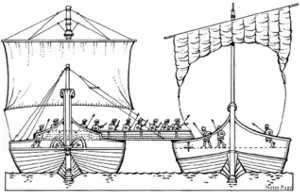Corvus: It Won the Punic Wars for Rome
P>Corvus–it doesn't sound very exciting or stunning. But its invention and the results of that invention changed the course of history. The Romans had won their peninsular wars and were masters of all Italy. They had even started interfering with the affairs of Sicily and Sardinia. They wanted to be masters of all they surveyed, but they didn't really have a navy. Their opponents in the war for supremacy of the Mediterranean were the Carthaginians, who knew quite a thing or two about building warships. They had merchant ships to spare, of course, but they had powerful fighting ships as well. The Romans had no hope of besting the Carthaginians in a sea battle. Unless ... The Romans were unmatched in military tactics and might--on land. How, then, to make the Carthaginians come to a land battle? The seamen kept to their strengths, preferring to sail circles around the Romans rather than engaging in a pitched battle with the mighty legions. And then came the shipwreck. A Carthaginian wrecked ship was washed onto a Roman shore. Roman carpenters and scientists studied it and duplicated it. They also came up with a brilliant idea: Why not find something to link two ships together? It sounds so ordinary to us today, when we've seen countless pirate battles on TV and in the movies. Yet to the Romans, it was revolutionary. In short
order, they had their new,
Carthaginian-based fleet steaming into the
Mediterranean, corvuses on board. The next
time they encountered the Carthaginian
fleet, the Romans headed straight for
them, got in close enough, and put the
corvus to use.
The corvus was a sort of running board or ramp that had a sort of natural locking mechanism on each end in the form of handles. The Romans would lock end on their ship, heave the corvus toward an enemy ship, lock the other end on that ship, and storm troops across. Now, this required precision and was dependent on the ability of the Roman ships to keep pace with enemy ships and avoid the occasional hurled missile from those enemy ships. But once the corvus was in place, those two ships were locked together and the mighty Roman legions could walk across a plank onto the surface of the enemy ship and engage the enemy troops in hand-to-hand combat. This was the Roman version of turning a sea battle into a land battle. The effectiveness of the corvus was devastating to the Carthaginians. It meant that they no longer ruled the seas. With such a means of commerce and protection and attack lost, they were reduced to such foolhardy measures as Hannibal's crossing the Alps, a thousand-mile detour forced by the Romans' bottling up of the Med south of Italy. The invention of the corvus indirectly led to Roman victories in the Punic Wars and cemented Roman might and reputation as supreme in the Mediterranean world. |
|
Social Studies for Kids
copyright 2002–2024
David White





